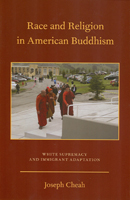Events
Your AAR staff continues to work toward holding the Annual Meeting in Boston, Nov. 21-24, 2020. We are aware of the uncertainty and contradictory projections related to the COVID-19 pandemic and with health and safety as a priority, we will continue monitoring the guidance of governments and health experts as we plan and make decisions. Should any changes need to be made related to the 2020 Annual Meeting, we will promptly notify you.
Open Registration:
All remaining regional meetings for 2020 have been canceled
|
Cheah, Joseph

Description
While academic and popular studies of Buddhism have often neglected race as a factor of analysis, the issues concerning race and racialization have remained not far below the surface of wider discussion among ethnic Buddhists, converts, and sympathizers, regarding representations of American Buddhism and adaptations of Buddhist practices to the American context. In this book, Joseph Cheah provides a much-needed contribution to the field of religious studies by addressing the under-theorization of race in the study of American Buddhism. Through the lens of racial formation, Cheah demonstrates how adaptations of Buddhist practices by immigrants, converts, and sympathizers have taken place within an environment already permeated with the logic and ideology of whiteness and white supremacy. In other words, race and religion (Buddhism) are so intimately bound together in the United States that the ideology of white supremacy informs the differing ways in which convert Buddhists and sympathizers and Burmese ethnic Buddhists have adapted Buddhist religious practices to an American context. Cheah offers a complex view of how the Burmese American community must negotiate not only the religious and racial terrains of the United States but also the transnational reach of the Burmese junta.
Additional Information
-
Hardback
-
178 Pages
-
Published: December 2011
-
ISBN: 9780199756285
-
Series: Academy
Ordering Information
|
